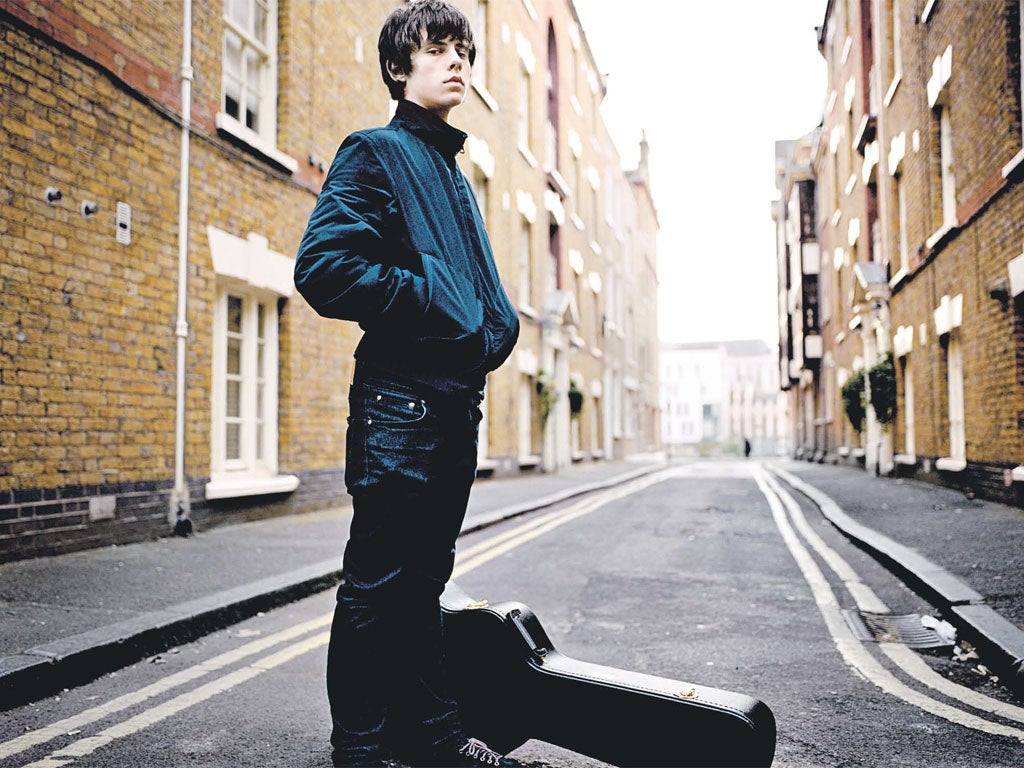Your support helps us to tell the story
From reproductive rights to climate change to Big Tech, The Independent is on the ground when the story is developing. Whether it's investigating the financials of Elon Musk's pro-Trump PAC or producing our latest documentary, 'The A Word', which shines a light on the American women fighting for reproductive rights, we know how important it is to parse out the facts from the messaging.
At such a critical moment in US history, we need reporters on the ground. Your donation allows us to keep sending journalists to speak to both sides of the story.
The Independent is trusted by Americans across the entire political spectrum. And unlike many other quality news outlets, we choose not to lock Americans out of our reporting and analysis with paywalls. We believe quality journalism should be available to everyone, paid for by those who can afford it.
Your support makes all the difference.Jake Bugg, On My One, Virgin EMI (3/5)
Download: Put Out The Fire, On My One, Gimme The Love
The aptly-titled On My One finds Jake Bugg taking more control over his music, producing all but three tracks himself. And he has a firm grasp of his capabilities, as witness particularly the chipper rockabilly two-step “Put Out The Fire” and the breakneck rocker “Gimme The Love”, on which Bugg’s scattershot imagery is sprayed with a declamatory urgency clearly derived from rap. The title-track, by contrast, is a moodier, more introspective affair, the plaint of a lonely “poor boy from Nottingham” whose shattered dreams have left him wondering “Where’s God? He’s even left me on my one”. Though not quite as potent as Shangri La, but it constitutes a confident negotiation of the “difficult third album” hurdle.
Red Hot Chili Peppers, The Getaway, Warner Bros. (4/5)
Download: The Getaway, Dark Necessities, Go Robot, The Hunter
After 25 years, the Chili Peppers chose to record with a producer other than Rick Rubin; but in Danger Mouse, they chose wisely. He imposed the same method that proved so successful with The Black Keys, co-writing new material and bringing a keen pop sensibility to the arrangements – damped guitar picking and mouthed hi-hats for the title-track; crisp synthesiser sci-fi funk for “Go Robot”; and piano and two guitar figures muscled aside by Flea’s slap-bass for “Dark Necessities”, Anthony Kiedis’s claim of dangerous charm. As ever, California gets plenty of mentions, though there’s less filler than usual, the album reaching a yearning epiphany in the string-draped song for a son, “The Hunter”.
Miles Davis & Robert Glasper, Everything’s Beautiful, Columbia Blue Note Legacy (4/5)
Download: Talking Shit, Maiysha (So Long), Little Church, Milestones
Robert Glasper was afforded access to the masters of Miles Davis’s sessions for this tribute to the jazz legend, unthreading trumpet lines and piano grooves with the help of some guest stars. Erykah Badu lends a childlike charm to the sunburnt fizz of Glasper’s bossa nova version of “Maiysha (So Long)”, with Miles’s trumpet shining through towards the end. Laura Mvula transposes “In A Silent Way” with her own lyric about ways of listening. Elsewhere, Aussie group Hiatus Kaiyote turn “Little Church” into an exotica exercise, all shimmering flute, drones, wordless vocals and languid percussion, while Georgia Anne Muldrow creates a woozy synth version of Davis’s most emblematic groove, “Milestones”.
The Low Anthem, Eyeland, Washington Square (3/5)
Download: In Eyeland, Her Little Cosmos, Am I The Dream Or Am I The Dreamer
In recent years, probably only The Flaming Lips have been as indebted to the hardcore cosmicity of late-1960s psychedelia as The Low Anthem are on Eyeland, which precariously balances the lofty spiritual aspirations, childlike wonder and fantastical fairytale imaginings of classic British psych-rock in songs with titles like “Am I The Dream Or Am I The Dreamer” and “Her Little Cosmos”. The approach varies from delicate spider-webs of sound like “In Eyeland” and “The Pepsi Moon” to the distorted garage-rock chug of “Ozzie” and abstract noise-scapes such as “Waved The Neon Seaweed” and “Wzgddrmtnwrddz”. It’s musically ambitious, if over-stuffed at times, but unashamedly impenetrable lyrically, even with the “help” of the accompanying gobbledegook short-story and supposed Map of Eyeland.
Allen Toussaint, The Complete Warner Recordings, Warner Bros./Rhino (5/5)
Download: Electricity, On Your Way Down, Country John, You Will Not Lose, What Do You Want The Girl To Do?
Rather than the new American Tunes swansong album, this 2CD set compiling his three exemplary 1970s albums – including the peerless Southern Nights – offers the most compelling confirmation of Allen Toussaint’s genius as a producer and songwriter. As realised by The Meters, his “second-line” funk-soul polyrhythms knit together with the meticulous intricacy of cogs in a Swiss watch movement, while Toussaint’s own piano work seems to encompass the entire history of New Orleans music from Jelly Roll Morton to Professor Longhair, without ever sounding remotely retro. Augmented by a previously unreleased 1975 live set, this is a bounteous masterclass in imaginative suavity from a modest giant of American music.
Lubomyr Melnyk, Illirion, Sony Classical (3/5)
Download this: Cloud No. 81, Sunset, Solitude No. 1
Lubomyr Melnyk’s monkish demeanour on the cover of Illirion plays into the somewhat mystical image regarding the Ukrainian pianist’s so-called “continuous music”, which involves a constant blizzard of repeated minimalist figures. The short track “Sunset” is the clearest indicator here of Melnyk’s alleged world-record 19.5-notes-per-second capability, but the miasmic flurry of sound is the piano equivalent of speed-merchant lead-guitarists, imposing a claustrophobic atmosphere. The live improvisation “Solitude No. 1” is more pacific in tone, though the most successful piece here is “Cloud No. 81”, in which the built-up tension is ultimately resolved in an ecstatically sustained high-register motif.

Join our commenting forum
Join thought-provoking conversations, follow other Independent readers and see their replies
Comments